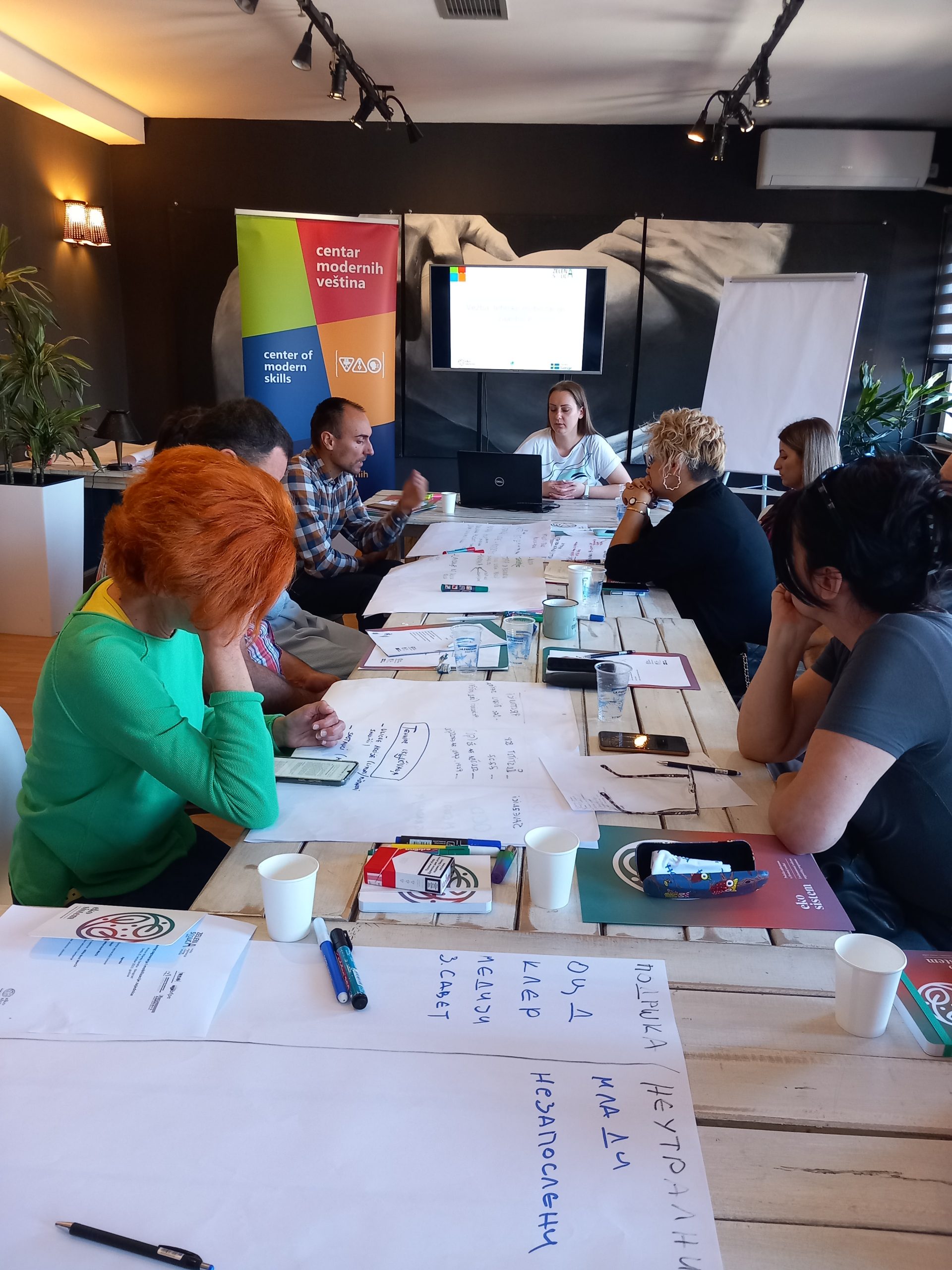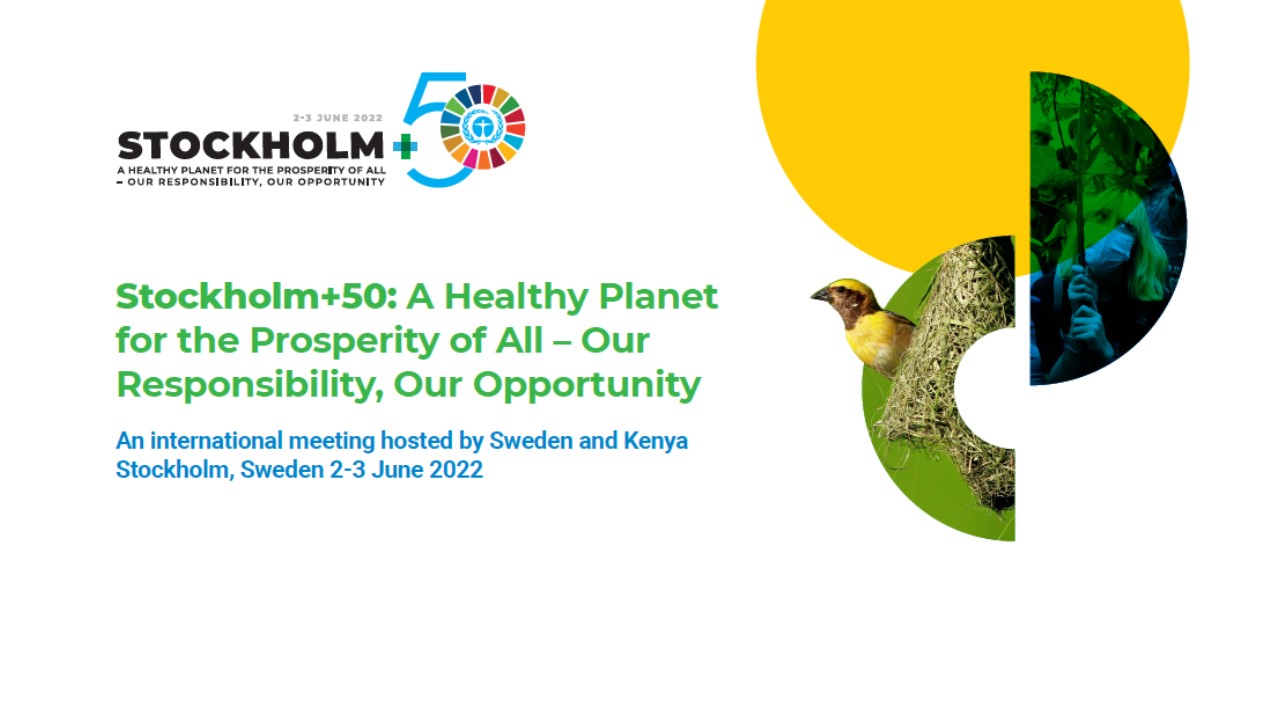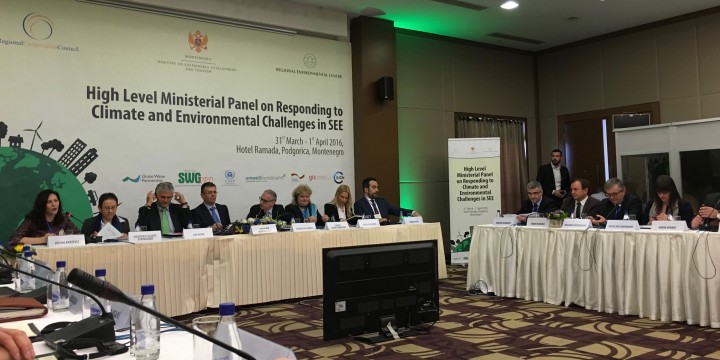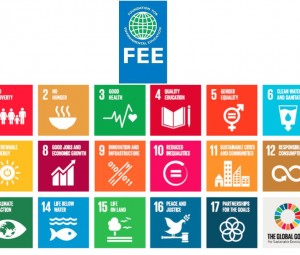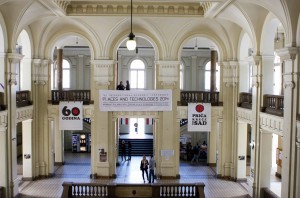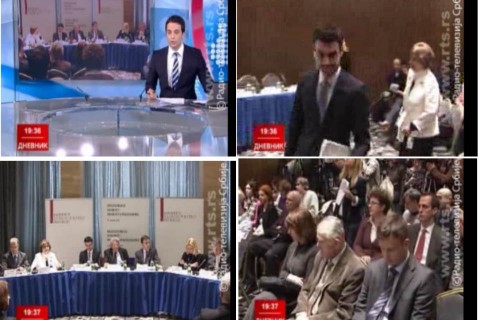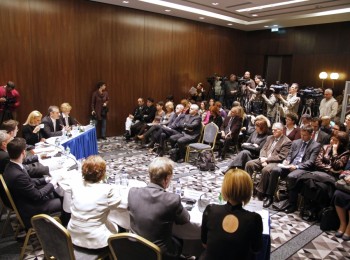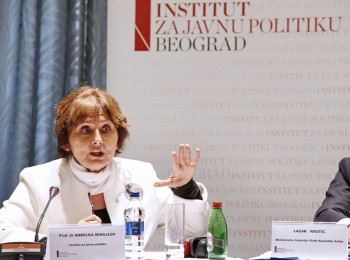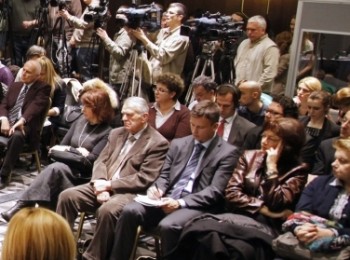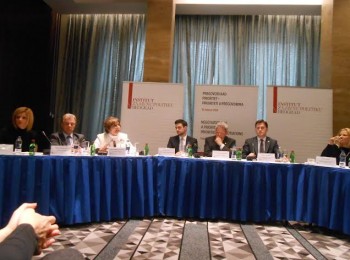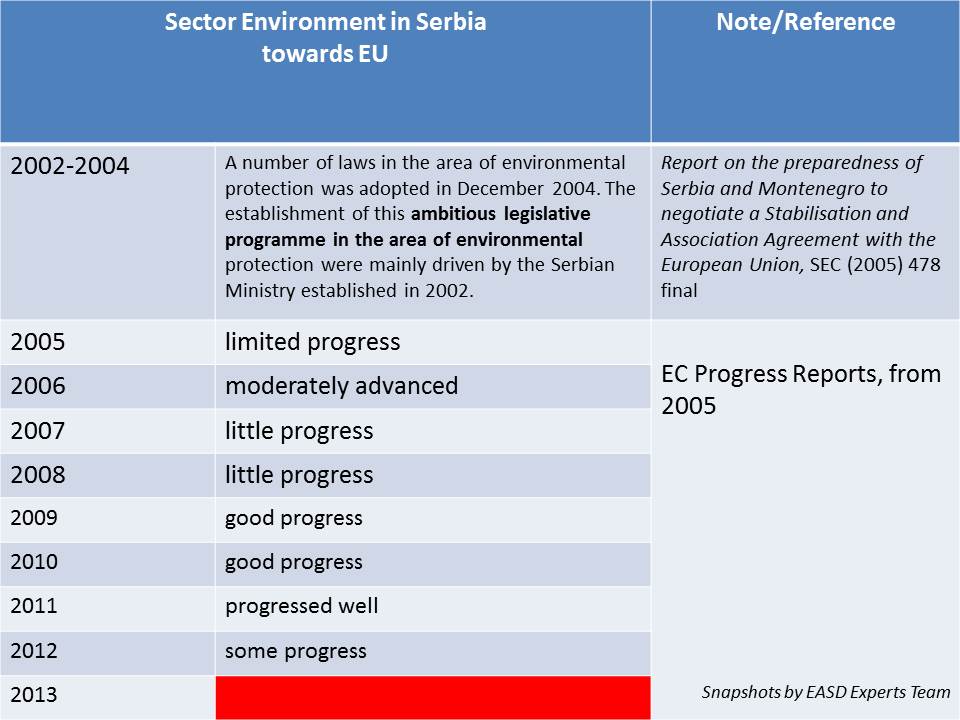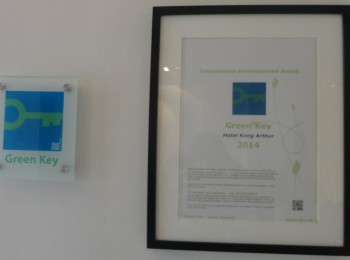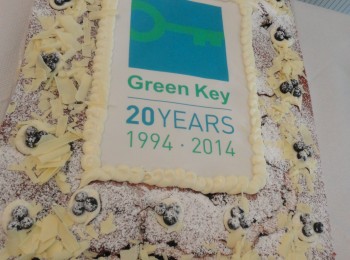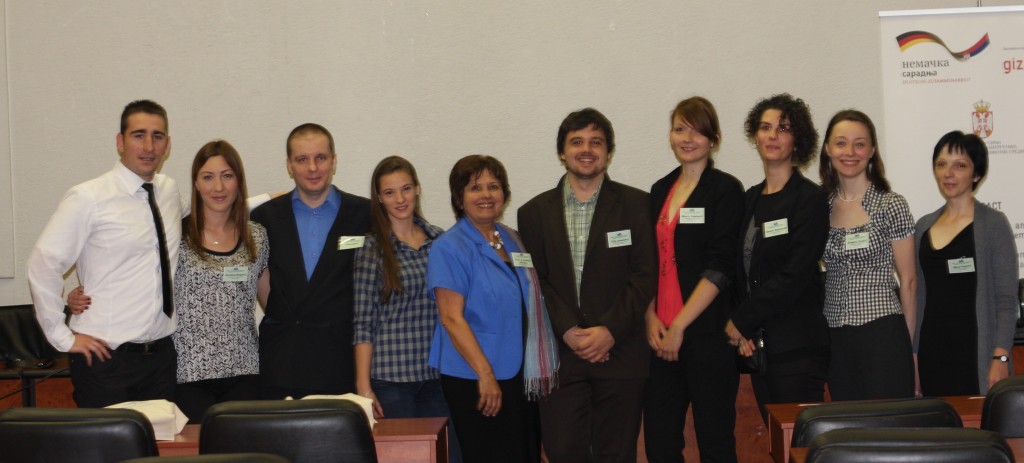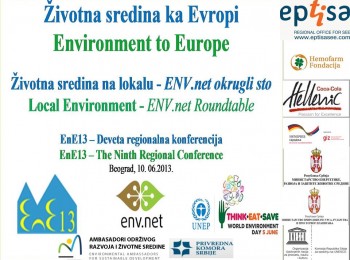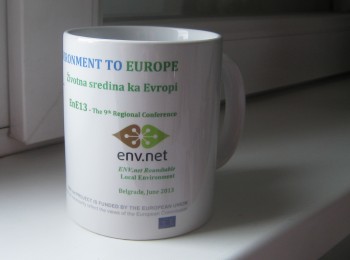ECO-SYSTEM AND “GREEN CHAIR”: PROJECT “CITIES READY FOR CLIMATE CHANGE”
Consultations and a workshop for the preparation of the proposal of the Strategic Plan of the “Green Chair” network were organized within the third cycle of the EKO-SYSTEM support program “Cities Ready for Climate Change”, in October 2023. The lead partner is the Centre for Modern Skills, and the partners are the Aarhus Centre Novi Sad, the BFPE Foundation for Responsible Society and the Environmental Ambassadors for Sustainable Development. The project aimed to improve further the work and strengthen the “Green Chair” network. The topic of the project is adaptation to climate change at the local level.
During the implementation of the project, another activity was consultations held with representatives of local communities: Kruševac, Pirot, Požega, Sremska Mitrovica and Subotica, to encourage advocacy at the local level, related to climate change.
The representative of the Environmental Ambassadors for Sustainable Development, Aleksandra Mladenovic, supported the preparation of a model of a local initiative for the city of Kruševac, which contains measures to mitigate climate change at the local level. As part of the mentoring work, two online thematic meetings were held, with the team for drafting a local initiative. It includes the concept of measures that will be proposed to the local self-government unit. The mentoring work resulted in greater cohesion of the local team, strengthening mutual communication and reaching an agreement on joint climate action at the local level.
Proposal of measures and recommendations for adaptation to climate change and mitigation of the impact of climate change, for local self-government units
General Measures
1. Include a set of measures and recommendations for adaptation to climate change in the development of spatial planning and strategic documents, Development Plans, and Local Environmental Action Plans.
2. Building, strengthening and improving capacities at the municipal level to a) adapt to climate change to introduce adequate measures into policies and decision-making processes at the local level, b) plan and implementation of climate policies, as well as modeling GHG emissions at the local level, and c) data collection, analysis and use (with a focus on the use of GIS), especially those related to river basins, flood maps, water source protection zones, erosion risk zones, etc.
3. Organizing trainings and seminars on available funds for the implementation of projects directly related to climate change (renewable sources, energy efficiency), joint training and seminars to strengthen institutional capacities and improve multisectoral cooperation.
4. Preparation of educational manuals to improve the understanding of the vulnerability of certain sectors to the impacts of climate change and to build resilience and adaptive capacity of the local community.
5. In cooperation with higher levels of government, strengthen the capacities (technical and human) of protection and rescue services at the local level to undertake organized and effective protection and rescue measures.
6. Establishment of an early warning system for the management of extreme climatic events (for all types of climate hazards: floods, droughts, landslides, forest fires, etc.).
7. Use of digital technologies to monitor extreme climatological situations (e.g. drone monitoring, real-time monitoring, etc.).
8. Establish a single database on droughts, floods and landslides and their damage.
9. Adapt Local Fire Protection Plans in the context of adaptation to climate change; ensure reserve amounts of water, by building or installing water tanks, etc. for effective fire protection (especially in open spaces).
Measures by sector
– Agriculture
1. To improve the knowledge of farmers about the impacts of climate change and to introduce them to examples of good practice from the countries of the European Union, but also from the surrounding countries.
2. In organized agricultural production, establish a hail protection system.
3. Improve irrigation infrastructure and ensure sufficient water for irrigation of arable land, in particular for agricultural production that takes place outdoors and is therefore exposed to weather conditions.
4. Receive and capsulate large waters when they exist and make them available in conditions of need through the construction of artificial reservoirs, which, in addition to the production of electricity, also create conditions for the development of tourism, provide flood protection of the downstream area and provides water for irrigation.
5. Implement measures to improve cooling in agriculture (construction of shelter from the sun, adequate accommodation, installation of fans and sprinklers).
6. Subsidize small agricultural producers, especially in the context of reduced incomes and agricultural yields during dry periods.
7. In agriculture, encourage the use of adequate varieties that are more tolerant to heat and drought, change crop patterns, target land management practices, farm structure, and adaptive capacity of farmers.
8. Application of measures aimed at preventing plant diseases, soil heating, etc.
9. Create the conditions and strengthen the awareness of farmers for adequate management of agricultural waste to reduce emissions from methane.
– Forestry
1. Maximize illegal logging control and implement forest health protection measures (occurrence of pathogenic fungi, occurrence of forest fires, define measures in response to snowstorms, wind gusts, frosts, etc.).
2. Intensify afforestation in landslide-prone areas and land erosion to reduce the risk of new landslides.
3. Establish comprehensive monitoring of areas at risk of erosion and landslides, with the preparation of plans and maps and action plans for prevention and control over their implementation.
– Civil engineering
1. To reduce the risk of landslides, establish continuous monitoring and documentation of illegal and unplanned construction of residential and other buildings and consistently implement regulations governing construction conditions.
– Water management
1. Plan the construction of a system for connection to the sewage network and wastewater treatment plants
2. Provide for continued investment in preventive protection and rescue measures, as well as full coordination with all actors having an impact on floods.
3. Procurement of adequate material and technical means and equipment is important for the provision and organization of all measures that affect the degree of vulnerability of people and material goods from floods.
4. To ensure timely and complete information to citizens about all measures and actions taken by the municipality to reduce the risk of floods, as well as to raise awareness of citizens about the possible consequences of floods.
5. Establishment of uniform inter-municipal and regional flood protection measures and a unified system of warning and notifying the competent structures of the upcoming danger, as well as the need to build a common (single) management system for hydropower facilities that have a regional character.
– Nature protection
1. Application of Nature Based Solutions, such as the maintenance and restoration of natural aquatic ecosystems (e.g. rivers, connecting river channels and meanders), afforestation, restoration and maintenance of grasslands, buffer zones, adequate land management, etc., because nature-based measures are more effective than technical infrastructure for flood protection (embankments, canals, etc.), both in environmental and economic terms.
– Waste management
1. Implement measures to reduce the waste that is deposited and adequate collection of municipal waste (collection networks in rural areas, construction of recycling yards, procurement of specialized equipment for waste collection, as well as activities to educate and raise awareness among the local population about the importance of this topic).
-Gender equality and human rights
1. At the local level, work on linking gender equality and climate change, as well as the realization of equal rights for all, especially vulnerable groups (e.g., youth, Roma, women, persons with special needs…), by implementing climate change mitigation measures.
UNEP@50 and World Environment Day
EASD is participating in Stocholm@50 preparatory meetings and conference 2-3 June 2022 . Also, celebrate with activities World Environment Day on June 5, 2022 .
Stocholm+50 mandate is to enable resolutions A/RES/75/280 of 24 May 2021 and A/RES/75/326 of 10 September 2021. Stockholm +50 offers an opportunity to reinforce the 1972 principles, opportunity for stakeholders to cooperate, share expertise and address complex issues for urgent actions.
EASD stay with whole-of-society approach; participated at Regional Multi-stakeholder Consultations (for Europe and North America) on May 5, together with different stakeholders, including youth, Indigenous Peoples, governments, and non-governmental organizations, who identified and highlighted some of the key messages, such as need to phase out fossil fuel subsidies in order to transition away from reliance on fossil fuels towards a more sustainable energy resources, or call for a declaration recognizing “the rights of nature,” as well as for governments to recognize “ecocide” as an international crime.
Environmental Ambassadors for Sustainable Development participated in the Regional Forum on Sustainable Development for the United Nations Economic Commission for Europe (UNECE) Region, held in Geneva on 6 and 7 April 2022 . Within the Side Event, together with other partners on the project “Water and Sanitation Safety Planning in the Balkan Region: Albania, North Macedonia, Romania and Serbia (WatSanPlan)”, presented the results of a year of work on the project.
EASD representative also participated at One Planet Network to accelerate the implementation of SDG12: The One Planet Network Forum, taking place 31.5. – 1.6. 2022.
Being a part of strong global and regional networks, EASD is actively contributing to position development of certain issues ( NGO Major Group, Women Major Group, Science and Technology Major Group, IPEN, EEB, WECF). Also, EASD participated on number of Towards Stockholm+ 50 Webinars as well as side events .
EASD also follow national preparation of Serbia, within 3 Leadership Dialogues. On outputs and outcomes of Stockholm+50 see more… Among others, about:
- United Nations Foundation/Unlock the Future Coalition
- Ministerial Statement on Future Generations led by Sweden and signed by other 14 countries
- Global petition for a UN Declaration of Rights of Mother Earth
- The People’s Environment Narrative, Stakeholder Forum for a Sustainable Future and the Norwegian Forum for Environment and Development, with the support of UNEP and the Swedish Government
- Stockholm+50 Interfaith Statement, Faith, Values and Reach – Contribution to Environmental Policy
- The Global Youth Policy Paper
- Declaration for Stockholm+50: Restoring Our Common Home
- Indigenous Peoples and Local Communities Declaration
The 2022 World Environment Day campaign #OnlyOneEarth calls for collective, transformative action on a global scale to celebrate, protect and restore our planet. This year’s campaign, #OnlyOneEarth, highlights the need to reset the balance with nature through transformative changes in how we eat, live, work and move around. This guide presents actions that communities, organizations and people everywhere can take. It spotlights the key responsibility of governments, cities, business, faith groups and finance to make sustainable living possible by transforming consumption, production, infrastructure, investment and land use. It also includes examples of personal decisions to effect change and push for action.
EASD contributed with activities focused on water safety, sanitation and hygiene, which included activities with children with special needs through the Eco-schools program in Serbia, under the knowledge-based campaign “Safety water for all”. The activities are realized during the EU Green week, from May 30th to June 3rd, using this annual opportunity to pay attention of local and national decision and policy makers to support inclusive environmental education, by using knowledge based advocacy. This activity relies on decades of achievements of the event “Environment to Europe”, which EASD organized as part of celebration of the World Environment Day.
EASD activities related SDGs
EASD team , from January 1,2018 will follow activities through SDGs lenses:
SD GOAL 1 – No Poverty SD GOAL 2 – Zero Hunger SD GOAL 3 – Good Health and Well-Being SD GOAL 4- Quality Education SD GOAL 5 – Gender Equality SD GOAL 6 – Clean Water and Sanitation SD GOAL 7 – Affordable and Clean Energy SD GOAL 8 – Decent Work and Economic Growth SD GOAL 9 – Industry, Innovation and Infrastructure SD GOAL 10 – Reduced Inequalities SD GOAL 11- Sustainable Cities and Communities SD GOAL 12 – Sustainable Consumption and Production SD GOAL 13 – Climate Action SD GOAL 14 – Life below Water SD GOAL 15 – Life on Land SD GOAL 16 – Peace, Justice and Strong Institutions SD GOAL 17 – Partnerships for the GoalsIn addition, we are following our activities as UN Environment TOPICS:
AIR CHEMICALS AND WASTE CLIMATE CHANGE EDUCATION AND TRAINING ENVIRONMENTAL GOVERNANCE FORESTS GREEN ECONOMY RESOURSE EFFICIENCY SUSTAINABLE DEVELOPMENT GOALS WATER SCIENCE, INNOVATION ENVIRONMENT UNDER REVIEW ( ENVIRONMENTAL ASSESSMENT, INFORMATION MANAGEMENT).The goal of this activities categorisation is EASD strategic planning of activities in future. It is also lesson learned after EASD representative participation at UNEA3 in Nairobi.
EASD and ECOSOC signals: Achieving sustainable development through infrastructure
Infrastructure is a pre-requisite for advances across the 2030 Agenda for Sustainable Development, including for reducing poverty, promoting economic growth, addressing inequality and ensuring environmental sustainability. Infrastructure is addressed directly through SDG 9, which commits the international community to build resilient infrastructure, promote inclusive and sustainable industrialization and foster innovation. Moreover, “investments in sustainable infrastructure are recognized as a major cross-cutting driver that can contribute to achieving all the SDGs”, as stated by Under-Secretary-General for UN DESA, Wu Hongbo, at the 2015 Global Forum on Development. Resilient infrastructure is essential for ensuring sustainable development for all. “If we are to achieve our goals, and leave no one behind, we must address large infrastructure gaps in developing countries,” said Secretary-General Ban Ki-moon at the inaugural Global Infrastructure Forum in April 2016.
“Developing countries, particularly the most vulnerable, need international support to bridge existing infrastructure gaps,” emphasized Secretary-General Ban Ki-moon during the Global Infrastructure Forum. Infrastructure gaps pose major challenges to the implementation of the SDGs. The financing gap for infrastructure in developing countries, for example, is estimated to be 1 to 1.5 trillion dollars annually. Through the Addis Ababa Action Agenda (AAAA), the international community has committed to support resilient, sustainable infrastructure and to provide a comprehensive framework for mobilising the means to finance it.
Infrastructure that enables countries to adapt to and mitigate climate change is needed to support the Paris Climate Change Agreement. New and resilient infrastructure is also needed to support sustainable urbanization, as the number of people living in cities in emerging economies is expected to double by 2030. Resilient infrastructure is needed, moreover, to cope with the increasing incidence and magnitude of natural disasters.
In recent years there have been several new global, regional and national initiatives aimed at increasing investment in infrastructure. In Africa, for example, infrastructure is a priority element for realizing the vision of Africa’s Agenda 2063. At the global level, the international community committed to support the realisation of resilient, sustainable infrastructure through the AAAA, and created a new Global Infrastructure Forum—which held its inaugural meeting in April—to facilitate access to financing and technical expertise.
The global discussion on infrastructure will continue on 21 July 2016 at UN Headquarters as part of ECOSOC’s 2016 thematic discussion on “Infrastructure for sustainable development for all”. The thematic discussion, part of ECOSOC’s High-level Segment, will engage a broad range of voices in a global dialogue on infrastructure for sustainable development that is inclusive and leaves no one behind. It will offer policy recommendations and inform the Inter-agency Task Force report on Financing for Development, as well as the 2017 Global Infrastructure Forum. For more information: UN Economic and Social Council (ECOSOC)
EASD already is addressing the issue of environmental infrastructure as the condition for sustainable development ( 1 , 2 , 3….), as well as by research and promotion ( A, B, C , …)
EASD participated at the First High Level Ministerial Panel on Responding to Climate and Environmental Challenges in South East Europe
01.04.2016: Climate change and environment – Crucial issues for SEE
Sarajevo/Podgorica – The First High Level Ministerial Panel on Responding to Climate and Environmental Challenges in South East Europe (SEE) took place today in Podgorica. The meeting was opened by the Montenegrin Minister of Sustainable Development and Tourism Branimir Gvozdenovic; the Secretary General of the Regional Cooperation Council (RCC), Goran Svilanovic; the Executive Director of the Regional Environmental Center (REC), Marta Bonifert; United Nations Environment Programme (UNEP) Regional Director, Jan Dusik and the German Ambassador to Montenegro, Gudrun Elisabeth Steinacker.
Speaking for the RCC, Secretary General Goran Svilanovic warned that SEE is vulnerable to climate change and that its water, energy, food and security of critical infrastructure is threatened by an increase in extreme events such as the catastrophic floods in Bosnia and Herzegovina, Serbia and Croatia in 2014. Svilanovic said that “the RCC is focused on providing a concerted regional approach towards climate resilient growth that ensures greater security and economic gains, than isolated unilateral interventions at the national level”. He emphasized that “one of the most important global events last year was the Paris Climate Conference and our task in the region is to make sure we implement the decisions from Paris and the RCC is fully committed to that goal.
The ministers, together with other international partners and representatives of the civil society organisations (with EASD representative participated at event) discussed the state of climate and environment in SEE and reviewed the state of ongoing regional cooperation in this field. The focus was on the advantages and shortcomings of the current initiatives. In a joint declaration titled “The Podgorica Initiative”, adopted at the meeting, the ministers supported a regional approach to environmental and climate change issues and commended the cooperation with the RCC which has supported the establishment of the Regional Working Group on Environment. The chairing of the Working group was passed on from Montenegro to Serbia today. The Ministers also asked the host country of this meeting to convey the declaration to the Paris Western Balkans Summit in the summer of this year.
SDGs as the relevant part of the context within which FEE operates
After a long series of intergovernmental negotiations on various themes,which saw a broad participation from major groups and civil society stakeholders under the guidance of the United Nations State Members, the Goals have been adopted on September 25th at the New York United Nations Summit by 193 Member States. In the same occasion, the UN launched their post-2015 development agenda, in which the Goals are integrated. UN Member States, the civil society and private sector contributors will use this new, universal set of goals, targets and indicators to guide development global efforts over the next 15 years in a concerted international action within the broadest, most ambitious development agenda ever agreed at the global level. The 17 Goals and 169 Targets are meant to be action-oriented, concise and easy to communicate, aspirational, global in nature and universally applicable to all countries, while taking into account the different national realities, capacities and levels of development and respecting national policies and priorities.
The Foundation for Environmental Education with its global network thus needs to frame and highlight its role as a stakeholder and trendsetter in the Sustainable Development process, particularly for environmental, educational and eco-tourism matters. The SDGs will define a relevant part of the context within which FEE operates, thus we are driven to reflect our work in the Goals.
FEE through its mission of fostering awareness, knowledge, participation, commitment, skills, actions and creativity on the environment and on sustainable development, shares the core values behind the set of SDGs. The programmes based on Education for Sustainable Development, such as YRE, Eco-Schools and LEAF show a strong link with the educational Goal (SDG 4) and the Goal on global partnership for sustainable development (SDG 17). FEE’s tourism eco-labels, Green Key and Blue Flag, on the other hand, have a focus on making human settlements inclusive, safe, resilient and sustainable (SDG 11) and on implementing tools for monitoring sustainable development impacts for tourism (SDG 12.b).
Thus, FEE as an umbrella organisation aims at reaching objectives as indicated in the SDGs:
– “Ensure healthy lives and promote well-being for all at all ages” (SDG 3).
– “Ensure inclusive and equitable quality education and promote life-long learning opportunities for all” (SDG 4).
– “Ensure availability and sustainable management of water..” (SDG 6),
– “Ensure access to affordable, reliable, sustainable, and modern energy for all” (SDG 7),
– “Conserve and sustainably use the oceans, seas and marine resources for sustainable development” (SDG14), as well as to
– “Protect, restore and promote sustainable use of terrestrial ecosystems..” (SDG 15).
– “Promote sustained, inclusive and sustainable economic growth..” (SDG 8), particularly to “..Implement policies to promote sustainable tourism which creates jobs, promotes local culture and products” (SDG 8.9).
– “Make cities and human settlements inclusive, safe, resilient and sustainable” (SDG 11).
– “Ensure sustainable consumption and production patterns” (SDG 12).
– “Take urgent action to combat climate change and its impacts” (SDG 13).
– “..Promote sustainable use of terrestrial ecosystems..” (SDG 15).
– “Promote peaceful and inclusive societies for sustainable development..” (SDG 16), particularly to build transparent institutions and promote non-discriminatory policies for sustainable development (SDGs 16.6, 16.b) with a positive, proactive, democratic modus operandi and a strong synergic support to civil society and third sector.
– “Strengthen the means of implementation and revitalize the global partnership for sustainable development” (SDG 17) through a geographically spread, multi-stakeholder approach.
Programmes’ overview:
a) YRE: Young Reporters for the Environment is a network of international youth engaged in environmental journalism and Education for Sustainable Development, where the students investigate an environmental problem and report it to the local community, while, at the international level, they may cooperate with young reporters from other countries for sharing information or data, with the aim of proposing a solution and disseminating it.
The most evident link between the Young Reporters for the Environment programme and the SDGs is found in the Goal 4:
“Ensure inclusive and equitable quality educationand promote lifelong learning opportunities for all” and its subparagraphs“..increase … the number of youth and adults who have relevant skills, including technical and vocational skills, for employment, decent jobs and entrepreneurship” (SDG 4.4) with the aim of learning to think critically, “ensure all learners acquire knowledge and skillsneeded to promote sustainable development, including among others through education for sustainable development and sustainable lifestyles, human rights, gender equality, promotion of a culture of peace and non-violence, global citizenship, and appreciation of cultural diversity and of cultures contribution to sustainable development” (SDG 4.7) for being able to connectwith concrete issues.
The environmental educational programme thus also wish for taking “action to combat climate change and its impacts” (SDG13), specifically for what concerns to “improveeducation, awareness raising and human and institutional capacity on climate change mitigation, adaptation, impact reduction, and early warning” (SDG 13.3) through active solution-oriented learning. The programme canalso help to“promote mechanisms for raising capacities for effective climate change related planning and management, in LDCs, including focusing on women, youth, local and marginalized communities” (SDG 13.b).
YRE is a network of young people educating for sustainable developmentand environmental issues in general, thus it also supportsthe aim of many other SDGs, such as:
“Promotesustainable agriculture” (SDG 2).
“Promote well-beingfor all at all ages” (SDG 3).
“Achieve gender equality and empowerall womenand girls” (SDG 5).
“Ensure availability and sustainable management of waterand sanitation for all”, supporting and strengthening the participation of local communities (SDG6)
“Ensure access to affordable, reliable, sustainable, and modern energyfor all”(SDG7)
“Promotesustained, inclusive and sustainable economic growth, full and productive employment and decent work for all”, developing measures that support creativity and innovation (SDG8)
“Build resilient infrastructure, promoteinclusive and sustainableindustrializationand fosterinnovation”enhancing scientific research (SDG9)
“Make cities and human settlements inclusive, safe, resilient and sustainable … Reduce the adverse per capita environmental impact of cities, including by paying special attention to air quality, municipal and other waste management”(SDG 11)
“Ensure sustainable consumption and production patterns”, raising awareness on sustainable development and lifestyles which are in harmony with nature (SDG12)
“Conserve and sustainably use the oceans seas and marine resources for sustainable development”, aiming to preventmarine pollution and protectmarine and coastal ecosystems (SDG14)
“Protect, restore and promote sustainable use of terrestrial ecosystems, sustainably manage forests, combat desertification, and halt and reverse land degradation and halt biodiversity loss”, promoting the implementation of sustainable management of the forests (SDG15)
YRE helps to “Promotepeaceful and inclusive societies for sustainabledevelopment..”(SDG16)
YRE can encourage to “..Revitalize the global partnership for sustainable development” (SDG17)
The journalistic piece can influence the local communities to take action on various environmental matters
b) ECO-SCHOOLS: A global student-led change process in Education for Sustainable Development which involves also teachers’ training, integration in the school curriculum, environmental reviews, action plans, monitoring and evaluation, informing and involving the local community, setting an eco-code focusing on the various environmental themes (water, energy, waste, global citizenship..).
The programme is fully in line with the Goals:
“Ensure inclusive and equitable quality education and promote lifelong learning opportunities for all” increasing the number of youth and adults with relevant skills and ensuring that all learners acquire knowledge for promoting sustainable development, developinga culture of peace and global citizenship while upgrading education facilities to child, disability and gender sensitive ones as to provide a safe, inclusive and effective learning environment for all(SDG 4)
“Make cities and human settlements inclusive, safe, resilient and sustainable”, strengthening efforts to safeguard the world’s cultural and natural heritagewith a focus on schools’ waste management, resource efficiency and climate change mitigation (e.g. Litter Less Campaign) (SDG 11)
“Strengthen the means of implementation and revitalize the global partnership for sustainable development” (SDG 17).
The implementation of the Eco-Schools programme also works towards the achievement of the aim of more SDGs, such as:
“Ensure healthy lives and promote well-beingfor all at all ages” (SDG 3)
“Ensure availability and sustainable management of water and sanitation for all”, improving water quality and water-use efficiency with pollution reduction, minimizing the release ofhazardous chemicals, halving the proportion of untreated wastewater,increasing recycling or safe reuse and ensuring sustainable withdrawals together with the strengthening of the participation of local communitiesfor such purposes (SDG 6)
“Ensure access to affordable, reliable, sustainable, and modern energy for all” increasing the share of renewable energy and energy efficiency, with the result of creating also savings (SDG 7)
“Promote sustained, inclusive and sustainable economic growth, full and productive employment and decent work for all”with the improvement of resource efficiency in consumption and production as to endeavour to decouple economic growthfrom environmental degradation (SDG 8)
“Build resilient infrastructure, promote inclusive and sustainable industrialization and foster innovation” (SDG 9)
“Ensure sustainable consumption and production patterns”, using the natural resources efficiently, reducing the waste generation (including the food waste) and managing sustainably the chemical products (SDG 12)
“Take urgent action to combat climate change and its impacts”specially improving education, awareness raising and capacity on climate change mitigation, adaptation, impact reduction and early warning (SDG 13)
“Protect, restore and promote sustainable use of terrestrialecosystems..” (SDG 15)
“Promotepeacefuland inclusivesocietiesfor sustainable development… and build effective, accountable and inclusive institutions at all levels” highlighting the theme ofsocial justice(SDG 16).
c) LEAF: Learning About Forests wants to encourage environmental education through awareness raising among students, teachers and the wider school community, to increase knowledge about the key role forests play for sustainable life on our planet, reflecting their cultural, ecological, economic and social functions, with themes as biodiversity, climate, products or services, codes and myths.
The key Goals linked to the Learning About Forests programme are:
“Ensure inclusive and equitable quality education and promote lifelong learning opportunities for all”, increasing the number of youths and adults who have relevant skills and ensuring that all learners (referring to the whole school community) acquire knowledge and skills needed to promote sustainable development, including through education for sustainable development and lifestyles in harmony with nature (SDG 4)
“Ensure availability and sustainable management of water..”, protecting water-related ecosystems and supporting the participation of local communitiesfor improving water management(SDG 6)
“Protect, restore and promote sustainable use of terrestrial ecosystems, sustainable manage forests, combat desertification, and halt and reverse land degradation and halt biodiversity loss”, ensuring a sustainable use of terrestrial and inland freshwater ecosystems and their services, including their biodiversity, in particular forests, wetlands mountains and drylands, preventing the extinction of threatened species(SDG 15)
The principles behind LEAF are compatible with the aim of more SDGs:
“End hunger, achieve food security and improved nutrition, and promotesustainable agriculture”, implementing agricultural practices, such as the tree-planting events, which help maintain ecosystems and progressively improve land and soil quality (SDG 2)
“Ensure healthy lives and promote well-being for all at all ages” (SDG3)
“Ensure access to affordable, reliable, sustainableand modern energyfor all” (SDG7)
“Promote sustained, inclusive and sustainable economic growth, full and productive employment..”, endeavouring to decouple economic growth from environmental degradation and devising policies that encourage sustainable tourism which promotes local culture and products, such as jobs related to the forest, while learning to respect the forest community as well as its myths, laws and codes (SDG8)
“Make cities and human settlements inclusive, safe, resilient and sustainable”, strengthening efforts to protect and safeguard the world’s cultural and natural heritage while supporting positive links between the urban and the rural areas as to widen the access to inclusive green and publicspaces (SDG11)
“Ensure sustainable consumption patterns” through relevant information and awareness for achieving sustainable management and efficient use of natural resources (SDG12)
“Take urgent action to combat climate change and its impacts” improving education and awareness raising on climatechange and the role of forests (SDG13)
“Strengthen the means of implementation and revitalize the global partnership for sustainable development” (SDG17).
d) BLUE FLAG: The world’s biggest voluntary eco-label for beaches, marinas and eco-tourism boats works towards sustainable development through compliance with criteria dealing with environmental education and information, environmental management, water quality, safety and other services.
The principles and rules of the programme comply with the content of many Goals:
“Ensure availability and sustainable management of water and sanitation for all”, improving water quality with pollution reduction and minimization of hazardous chemicals release, increasing recycling, safe reuse and water-use efficiency through the usage of sustainable withdrawals as to protect water-related ecosystems also with the support and participation of local communities (SDG 6)
“Promote sustained, inclusive and sustainable economic growth, full and productive employment and decent work for all”improving the resource efficiencyin consumption while devising and implementing policies to promote sustainable tourism which creates job, promotes local culture and products.Blue Flag focuses as well on the protection of labour rights together with the promotion of a safe and secure working environment and the prohibition of child labour (SDG 8)
“Build resilient infrastructure..”upgrading it as to be sustainable and equipped with clean technologies (SDG 9)
“by 2030 empower and promote the social, economic and political inclusion of all irrespective of age, sex, disability, race, ethnicity, origin, religion or economic or other status”with the aim of reducing inequalities and discriminatory practices for wages as social protection policies (SDG 10.2)
“Make cities and human settlements inclusive, safe, resilient and sustainable”enhancing capacities for participatory and sustainable human settlements as to strengthen the efforts for safeguarding the world’s cultural and natural heritage while providing universal access to the public spaces particularly for women and children, older persons and persons with disabilities(SDG 11)
“Ensure sustainable consumption and production patterns”for the efficient use of natural resources, through a sound management and reduction of chemicals and wastes and the promotion of sustainable public procurement practices (SDG 12)
“Conserve and sustainably use the oceans, seas and marine resources for sustainable development”preventing and reducing marine pollutionalso from land-based activities, addressing the impacts of ocean acidification and conserving coastal and marine areas. Blue Flags also contributes in increasing the economic benefits to SIDS and LDCs with the sustainable use of marine resources through tourism (SDG 14)
“Protect, restore and promote sustainable use of terrestrial ecosystems… halt and reverse land degradation and halt biodiversity loss” for halting the loss of biodiversity and preventing the extinction of threatened species, also through the integration of ecosystem values into local planning policies (SDG 15).
The implementation of the Blue Flag programme also work towards the aim of several more SDGs:
• “Ensure healthy lives and promote well-being for all at all ages” (SDG3)
• “Ensure inclusive and equitable quality education and promote lifelong learning opportunities for all”as education has a central role in the programme and reaches out for all the persons involved in it as well as for theusers (SDG4)
• “Achieve gender equality and empower all women and girls”(SDG5)
• “Ensure access to affordable, reliable, sustainable,and modern energy for all” to help increasing the share of renewable energy and energy efficiency(SDG7)
• “Take urgent action to combat climate change and its impacts”(SDG 13)
• “Promote peaceful and inclusive societies for sustainable development..”enforcing non-discriminatory policies for sustainable development (SDG16)
• Strengthen the means of implementation and revitalize the global partnership for sustainable development”through a multi-stakeholder partnership, which involves also public partnersand local authorities,where knowledge and expertise are shared (SDG17)
e) GREEN KEY: This eco-label for tourism facilities (hotels, campsites, small accommodations, tourist attractions and restaurants) is a voluntary award that aims at contributing to prevent climate change and reach sustainable tourism by awarding and promoting best practice, with the goal of changing the environmental practices at the awarded establishments but also the behaviour of tourism actors, including guests, staff, suppliers, authorities, local communities so to involve them in increasingly safeguarding their own environment. The focus is on themes such as environmental management, water, waste and energy saving, involvement and awareness of guests and staff, management of food and beverage and open spaces.
For what concerns the part of the programme related to environmental management, the Goals mainly involved are:
“Ensure … sustainable management of water..” improving its quality, having the proportion of untreated wastewater, increasing recycling, safe reuse and sustainable withdrawals of freshwater (SDG 6)
“Build resilient infrastructure, promote inclusive and sustainable industrialization and foster innovation”setting rules for developing or upgrading quality infrastructures to support economic development and human well-being for an increased resource use efficiency and greateradoption of clean technologies (SDG 9)
“Make … human settlements inclusive, safe, resilient and sustainable”paying attention to air quality, indoor environment and waste management as to tackle climate change(SDG 11)
“Ensure sustainable consumption and production patterns”with rules for achieving sustainable management of natural resources,respecting eco-criteria for food and beverages, reducing waste generationand achieving environmentallysound management of chemicals (SDG 12).
This way the programme “develops and implements tools to monitor sustainable development impacts for sustainable tourism which creates jobs, promotes local culture and products” (12.b).
As an eco-tourism programme focused on the environmental awareness of staff and guests, the Goals principally involved are:
“Ensure healthy lives and promote well-being..” where the programme has to encourage the users to take part in green activities (SDG 3)
“..ensure all learners acquire knowledge and skills needed to promote sustainable development, including among others through education for sustainable development and sustainable lifestyles, human rights..” as part of the “educational Goal” (number 4), whereby the learners are the recipients of the environmental information expected in the implementation of the programme (SDG 4.7)
“Promote sustained, inclusive and sustainable economic growth, full and productive employment and decent work for all”, as the Green Key programme sets Corporate Social Responsibility and safety rules for the workers(SDG 8)
“Take urgent action tocombat climate change and its impacts”through a reduced environmental impact but also through the improvement of education and awareness raising for both the facilities’ staff and users (SDG 13)
“..revitalize the global partnership for sustainable development” (SDG 17).
European Western Balkans Interview: Andjelka Mihajlov, Environmental Ambassador for Sustainable Development
European Western Balkans Interview: Andjelka Mihajlov, Environmental Ambassador for Sustainable Development
Prof dr. Anđelka Mihajlov, Environmental Ambassador for Sustainable Development, is a Full Professor at Faculty of Technical Sciences, the University of Novi Sad and Coordinator for environment and green economy at the Public Policy Institute. UN and EU expert, scientist and consultant. She has more than 300 published scientific papers. In last 20 years, her frameworks of the professional orientation are the environment and sustainable development.
European Western Balkans: What are in your opinion, the biggest ecological problems in Serbia?
Andjelka Mihajlov: The decades in which values and prosperity were/is created based on the principles of traditional economic models not managed to change ever-growing excessive consumption of natural resources and to fight marginalization of environmental issues. This is diagnosis for all over the Western Balkan region. My opinion is, that despite some good and very good snapshots and flagship cases relevant for environment sector, the highest environmental problem in Serbia, as well as in all countries in region, is “position” of sector in agenda of development: not among priorities and priority concerns.
EWB: Serbia expects one of the most difficult chapters in the negotiations with the EU, Chapter 27 relating the environment. In what extent is Serbia preparing for the opening of this chapter?
Serbia is having now 14 years of commitment to EU membership. In environmental sector it was, and it is a great challenge, especially having in mind “grey and brown environmental heritage”. In the frame of these more than ten years of actions, I could tell that improvement is respectable. However, a lot of issues remain unsolved.
In 2012 Serbia became a candidate for EU membership, and on 21st of January 2014 officially opened accession negotiations. Environmental negotiation process in Serbia started with Explanatory screening in September 2014, and followed with bilateral screening in November 2014. Screening report is expected by EC sometimes in 2015. Progress towards EU in the sector Environment (and Climate Change) vary from limited progress (2005), to moderate advanced (2006), little progress (2007, 2008, 2013,2014), some progress (2012), progressed well (2011), the establishment of ambitious legislative program (2002-2004), and to good progress (2009,2010).
And coming back to the question, Serbia is prepared and preparing to open negotiation in Chapter 27, with strong message from my side: it is crucially important to include people/experts with appropriate knowledge, skills and experience, as well as to effective coordinate actions with other sectors.
EWB: What will pose as a major challenge in this chapter?
AM: One of the main challenge is to harmonize socio-economic development with EU’s Resources-Efficient and Low-Carbon Policies and to implement in national legislation, already transposited EU environmental acquis at large extend.
I would like to underline a few national strategic documents: Strategy towards EU accession (2005), National Environmental Program (2010), with Action Plan (2014/15) and the 2011 National Environmental Approximation Strategy. The last one sets three goals: full and high quality transposition of the EU environmental acquis; maintenance of effective and affordable environmental infrastructure and services; and institutional arrangements for efficient approximation.
EWB: How much are events such as IV International Miteco Forum important in this process?
AM: I should acknowledge the intention of the Miteco Forum to bring professionals and experts to the floor, together with governmental official, international organization representatives and all interested in subject. I am very happy that I had opportunity to share reflection from 2014 European Resources Forum, just finished in Berlin, where I participated. I talked on Panel, promoting sustainable use of natural resources in hand with climate change actions. The part of my presentation was short introduction of the Seventh Environmental Action Program to the Miteco Forum audience.
And one more value of Miteco Forum – this is starting to be growing “family gathering” of professionals interested in environmental and waste issues. My pleasure is to see among them, my colleagues, followers, former and current students and civil society fellows.

EWB: What do you think is a good model for solving the problems of industrial and hazardous waste in companies that are in the process of restructuring?
AM: It is known, that personally I “entered” environmental sector through “hazardous waste door”. For years I was technical expert on Basel convention issues.
I do support main principles of preventive measures and environmentally friendly measures for and future generations’ well-being.
I do not support “one model fit all” in solving historical and existing pollution, mainly related to the industrial and the hazardous waste, in companies changing ownerships.
Environmental Due Diligence and environmental liability tools, combined with technical feasible solutions, could serve as the guideline frame. For now, when country do not have licensed hazardous waste facility, technical feasible solution is the export of hazardous waste (as it is practice in Serbia). It has to be understand, that when changing the ownership of company it should go hand-in-hand with proposed solutions and decision who is paying.
EWB: What are benefits of Serbia joining the European Union when it comes to the field of environmental protection?
AM: With EU accession and membership, Serbian citizens should have great benefits to share the same, high environmental values.
Empowering the environment sector, including promoting knowledge based actions and straightening expert capacities, as well investment in infrastructure that supports all aspects of sustainable development (sustainable/green growth) with socially sensible job creation, are challenges we are facing. We should “position” environment sector much higher in the agenda of development!
Andjelka Mihajlov was a member of the Serbian Government as the Minister for Protection of Natural Resources and Environment from June 2002 to March 2004, commencing significant reforms in the environmental sector in the country, with significant results in international and regional cooperation. In 2006, UN Environment Program identified her as the woman “environmental leader of the Western Balkans”. Prof. Mihajlov headed the expert team which prepared the Study on Green Economy for Serbia which was the basic platform for participation of the Serbian delegation at Rio+20 UN Conference in Brazil. In the period from 2005 to 2010, she was the member of the Environmental and Social Advisory Council to the European Bank for Reconstruction and Development in London. She is a member of the National Committee for UNESCO and the Committee for Environment and Sustainable Development of the Serbian Chamber of Commerce. She is national mentor for Foundation for Environmental Education with the seat in Copenhagen
The final 17 SUSTAINABLE DEVELOPMENT GOALS
In the Outcome Document from the Open Working Group on Sustainable Development Goals, session held on 19 July 2014, there are 17 SDGs:
Places and Technologies 2014
On April 3, 2014, as the Conference Guest lecturer, Prof Andjelka Mihajlov participated in Plenary, presenting interconnections between sustainable cities planning and design, climate change and sustainable development. The main tasks of this First International Academic Conference PLACES AND TECHNOLOGIES are issues related to:
- the future of society and places,
- design of places, facilities and infrastructure in line with new and future needs of inhabitants,
- development of institutions and regulations with an aim of creating appropriate and high quality environment, and
- creation of favourable conditions for the advancement of innovation and business.
19 focus areas recommended for further consideration at upcoming intergovernmental negotiations on SDGs
19 focus areas recommended for further consideration at upcoming intergovernmental negotiations on Sustainable Development Goals – SDGs (which will start on March 3, 2014).
19 focus areas are:
- Poverty eradication
- Food security and nutrition
- Health and population dynamics
- Education
- Gender equality and women’s empowerment
- Water and sanitation
- Energy
- Economic Growth
- Industrialization
- Infrastructure
- Employment and decent work for all
- Promoting equality
- Sustainable cities and human settlements
- Sustainable Consumption and Production
- Climate
- Marine resources, oceans and seas
- Ecosystems and biodiversity
- Means of implementation
- Peaceful and non-violent societies, capable institutions
Knowledge based advocacy: Environment should be within priorities in the negotiations with EU
Public Policy Institute organized on 18 February, 2014 in Belgrade the Panel discussion „Negotiations as a priority – priorities in the negotiations“.
Panelists were:
– representatives of the PPI : Prof. Nikola Samardzic, Prof. Stevan Lilić, Prof. Mijat Damjanovic, Prof. Anđelka Mihajlov, andGordana Lazarevic.
– representatives of the Government of Serbia: Dr. Tanja Miščević, Head of the Serbian negotiating team with the European Union,Nikola Selaković, Minister of Justice and Public Administration, and Lazar Krstic, Minister of Finance.
Moderator of the panel was Selena Tasic.
The important issues of priority in the negotiations were addressed, including the background information why environmental sector should be among the priorities.
Prof. Anđelka Mihajlov raised the question: If the knowledge is used as a tool and we know that one-third of the EU acquis is in environment sector, should that sector be among the priorities of European integration?
She pointed out that the answer is self-explanatory and that Chapter 27 should be among priorities. She underlined that Chapter 27 is very difficult to negotiate, among other things, because it affects the competence of many ministries with the significant responsibility of the Ministry of Finance. In addition, she pointed out that other sections of the negotiation, such as food security, rural development and agriculture, fisheries and energy, in many areas depend on the infrastructure achieved in waste management, waste water management and industrial pollution control. She also said that now it will be good to take advantage of momentum when we are because after more than ten years of “ knocking on the EU’s door, have the door opened,” and mobilize teams for each chapter.
Representative of the ENV.net project participated at this meeting.
ENV.net snapshot analysis: While waiting for EC 2013 Progress Report
ENV.net snapshot analysis
Legislation: In terms of the degree of compliance with the EU environmental acquis, intense legislative activity of the Ministry in charge of Environment and other institutions with responsibility in this area has led to a significant level of transposition of the relevant EU regulations. According to the Progress Monitoring Report for the year of 2012, the majority of EU directives relating to the so-called horizontal issues, nature protection, management of chemicals and noise are completely or almost completely transposed into national legislation. In other areas (air quality, waste management, water protection and industrial pollution control) the bulk of EU legislation has largely been transposed into national legislation. With regard to the obligations of the Republic of Serbia as a non-Annex 1 country in the UN Framework Convention on Climate Change and the complexity and cost of implementation of these regulations, the compliance with the acquis in the climate package has just started. National Environmental Approximation Strategy, with the assumption that the Serbia will be a member of the EU by 2019, provides for the achievement of full transposition of most of the acquis by the end of 2014.
Administrative and institutional capacity: The existing administrative capacity, especially at the local level are assessed as insufficient for adequate implementation. Given the complexity of the environmental acquis, and the fact that the jurisdiction of the EU is divided between a numbers of institutions in this area, there is a strong need to further strengthen inter-agency cooperation and coordination.
Environmental infrastructure: Given the state of the infrastructure, as well as the experience of the new EU member states in this process, the Strategy estimates that full implementation of EU regulations will be completed by 2030, and that the total cost of full implementation of EU legislation in the field of environment will be around 10.6 billion euros.
Financial investments: Given the institutional complexity and multidisciplinary nature of the field of environment, full transposition of the acquis may require a longer time frame, especially in the case of directives that require large financial investments (heavy investment directives).
Year 2013: The activities in the sector stagnated in 2013, and it is to be seen how it will be reported in the 2013 Progress Report, as well as to see the further “speed” to implement commitments in environmental sector.
EASD participated in the process towards Progress report for 2013 (2013-Progress-Report-EASD-contribution).
Green Key
Green Key is presently the largest global eco-label for accommodation and has a national administration center (in Serbia this is organisation “Environmental Ambassadors for Sustainable Development”) in each participating country.
Green Key is an independent Programme recognized and supported by the World Tourism Organization and UNEP.
National operator is planning starting implementation of the program in Serbia in 2014. International criteria reflect the various fields of tourism facilities (hotels, hostels, camp sites, conference and holiday centers) and specialized national criteria reflect each country’s legislation, infrastructure and culture.
More information at FEE Serbia site, in Serbian
EASD was approved as the FEE FULL MEMBER ORGANISATION at FEE GA in June 2014.
_____________________________
Green Key National Operator Meeting 4 – 7 November 2025 in Marseille, France
…..
FEE busy September 2018: General Assembly and Green Key NOM
Pavle Pavlović – National Coordinator for GREEN KEY Project (2017/2018)
2017 International Year of Sustainable Tourism for Development
Serbian Visions 2016 : Blue Flag and Green Key programs presented by FEE SERBIA (EASD)
WED Messages from Serbia: 12th Regional Conference “Environment to Europe”
October 2015 SDGs as the relevant part of the context within which FEE operates
Radisson Blu Old Mill Belgrade – The first GREEN KEY HOTEL in Serbia , February 2015
We participate on Green Key national operator meeting 2014
National FEE Committee Meeting, September 6, 2013
_____________________________
More than 120 participants at EnE13 conference/ENV.net Roundtable: 10 June, 2013 in Belgrade
The main messages from this participatory ENV.net event are: environmental sector activities should be knowledge based, and education for environment and sustainable development should be priority. Capacities and continuity is very important for inclusion environment in other sectoral policies. Conference is institutionally supported by Ministry of Energy, Development and Environmental Protection and Ministry of Natural Resources, Mining and Spatial Planning, as well as National Commision for UNESCO. Draft Agenda ( Agenda FINAL on 06 06, strane 2-8 ) and CD Proceeding of Papers are published. This Conference is UNEP WED event.
At the opening session, Mrs. Prof. dr Zorana Mihajlović, Minister of Energy, Development and Environmental Protection of Republic of Serbia, Mr. Christoph Eichen, First Secretary Economic Cooperation, Embassy of Germany in Serbia, Mr Andrew Headey, EC Delegation in Serbia, Mr Jürg Staudenmann Deputy Resident Representative UNDP Serbia, SEIO Representative, European Integration Office, Government of the Republic of Serbia, Mr. Prof dr. Ivica Radović, Assistant Minister, Ministry of Education, Science and Technological Development of the Republic of Serbia, Mr Klaus Schmidt – Team Leader of IMPACT project – Deutsche Gesellschaft für Internationale Zusammenarbeit (GIZ) GmbH, Representative of Eptisa Regional Office for SEE, as well as Mr Dušan Stokic of Serbian Chamber of Commerce and Industry, shared the views related environmental sector and EU Integration. Event is officially oppened by Mr. Goran Trivan, Secretary for Environmental Protection, City of Belgrade.
Municipal Infrastructure Support Programme (MISP), EU-IPA Project, EPTISA, is presented by Dragana Vasić, Deputy Team Leader. MFA, LCA and Cleaner Production as Analitical Tools in Environment are presented by , prof. dr Hristina Stevanović Čarapina, IMPACT project- Deutsche Gesellschaft für Internationale Zusammenarbeit (GIZ) GmbH representative.
The Importance of the Participation of Civil Society Organizations in Decision-Making Process is addressed by Milena Banović, Office for Cooperation with Civil Society, Government of the Republic of Serbia Representative .
Analysis of current status of EU Environmental Integration and ENV.net project is presented by Prof dr Nataša Žugić Drakulić, National Coordinator, ENV.net Project .
Coordinator for Conference is Doc dr Dunja Prokić. Conference chair person is Prof f dr Andjelka Mihajlov.
Conference is supported by: Eptisa Regional Office for SEE, Hemofarm fond i Coca Cola Hellenic.
Selected presentation: Dragana Vasić EnE13 -MISP for Serbia
More selected presentations in Serbian.
Minutes from event are posted in gallery.
Reported by ACUNS, UNEP, FEE.
———————————————————————————————————————————
On behalf of Organizing Committee of the ninth Regional Conference “Environment to Europe-EnE13”, we want to inform you that the conference will be held on 10 June, 2013, presenting one of the events for World Environment Day (UNEP), as well as conference supporting EU accession process in sector Environment through project “Development of the ENV.net in West Balkans and Turkey: giving citizens a voice to influence the environmental process reforms for closer EU integration”. Serbian Ministry of Energy, Development and Environmental Protection acknowledged the importance of this Conference.
The theme for this year’s World Environment Day celebrations is Think.Eat.Save. Think.Eat.Save is an anti-food waste and food loss campaign that encourages you to reduce your foodprint.
Focus thematic issue this year is Local Environment. Each year EnE Conferences have different thematic focus.
We are inviting you to active participate on the Conference Environment to Europe – EnE13, either by preparing and presenting your paper, or by contributing as an auditor and participant (f application form_EnE13, Gidelines for paper preparation EnE13) .
Invitation is also distributed through FEE and ACUNS.
Application forms (with or without paper) and abstracts-papers send using email contact: conference.ene13@
Important dates:
Deadline for submission of applications form (for participants wishing to participate with paper): April, 15th
Deadline for submission of abstracts: April, 25th
Abstract acceptance notification: May, 6th
Deadline for submission of paper (extended abstracts): May, 15th (3-6 pages, in English or in Serbian / other language from former Yugoslavian Republics with Abstract in English)
Paper acceptance notification: May, 27th
Early registration deadline: May, 27th
Late registration deadline: May, 31st
Deadline for submission of application form without paper: May, 31st
Conference: June, 10
Participation fee :
Registration fee paid by May, 23 is 55 €
Regular price registration fee is 100 €
Payment: for details / account, please contact organizers by Email
Students are exempt from paying the registration fee.
Conference (EnE conferences) contributes to: EU and Accession, Regional Cooperation, International Cooperation, UNEP promotion , represent Scientific and other Conferences, Educational Signals and Courses, Scientific Signals and Projects, Promotion of Science, as well as Environmental Experts’ Networking
_______________________________________________________________________________________________________

